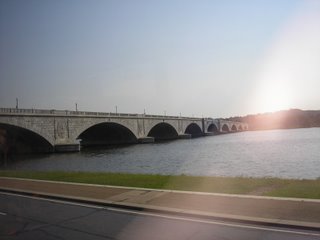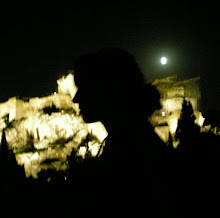Picture in your minds the Greek nobleman/scholar Pericles in his simple Athenian robe and cloak of white. The year is 431 B.C. Upon an elevated platform, the renowned general stands in the midst of the magnificent works of art and architecture which have been created under his leadership in the city-state of Athens that he so loves. On the Acropolis, as a backdrop for his audience, are the visible memorials of the glory that the Athenians have achieved: the Parthenon, the Temple of Athena and more.
In the face of the first losses of a long and difficult war, Pericles, described as having thunder and lightning on his tongue, marshals all his oratorical powers to remind the Athenians what they have achieved and what they must defend. This great statesman and orator is about to begin his panegyric, or extolment of those who have fallen in battle. He needs to convince the Athenians to think upon the greatness of their city; once they are completely in love with her, they must reflect that their empire was made great because the soldiers knew their duty and had the courage to do it.
Pericles Funeral Oration
Our form of government does not enter into rivalry with the institutions of others. Our government does not copy our neighbors', but is an example to them. It is true that we are called a democracy, for the administration is in the hands of the many and not of the few. But while there exists equal justice to all, the claim of excellence is also recognized; and when a citizen is in any way distinguished, he is preferred to the public service, not as a matter of privilege, but as the reward of merit. Neither is poverty an obstacle, but a man may benefit his country whatever the obscurity of his condition. There is no exclusiveness in our public life, and in our private business we are not suspicious of one another, nor angry with our neighbor if he does what he likes. While we are thus unconstrained in our private business, a spirit of reverence pervades our public acts; we are prevented from doing wrong by respect for the authorities and for the laws, having a particular regard to those which are ordained for the protection of the injured.
Then, again, our military training is in many respects superior to that of our adversaries. Our city is thrown open to the world, and we never expel a foreigner. We rely not upon management or trickery, but upon our own hearts and hands.
If then we prefer to meet danger with a light heart, with a courage which is gained by habit and not enforced by law, are we not greatly the better for it? Since we do not anticipate the pain, we can be as brave as those who never allow themselves to rest; thus our city is equally admirable in peace and in war. We are lovers of the beautiful in our tastes, and our strength lies, not in deliberation, but [in] that knowledge which is gained by discussion preparatory to action. For we have a peculiar power of thinking before we act, and of acting, too, whereas other men are courageous from ignorance but hesitate upon reflection. They are surely to be esteemed the bravest spirits who, having the clearest sense both of the pains and pleasures of life, do not shrink from danger. In doing good, we are unlike others; We alone do good to our neighbors not upon a calculation of interest, but in the confidence of freedom and in a frank and fearless spirit. To sum up: in the hour of trial Athens alone among her contemporaries is superior to the report of her. No enemy who comes against her is indignant; no subject complains that his masters are unworthy of him. We shall assuredly not be without witnesses; there are mighty monuments of our power which will make us the wonder of this and of succeeding ages. We have compelled every land and every sea to open a path for our valor, and have everywhere planted eternal memorials of our friendship and of our enmity. Such is the city for whose sake [our] men nobly fought and died; they could not bear the thought that she might be taken from them; and every one of us who survive should gladly toil on her behalf.
I have dwelt upon the greatness of Athens because I want to show that we are contending for a higher prize, and to establish by manifest proof the merit of these men whom I am now commemorating. In magnifying the city I have magnified them, and men like them whose virtues made her glorious. None of these men were [enamored] by wealth or hesitated to resign the pleasures of life; But, deeming that the punishment of their enemies was sweeter than any of these things, and that they could fall in no nobler cause, they determined at the hazard of their lives to be honorably avenged, and to leave the rest. They resigned their chance of happiness; but in the face of death they resolved to rely upon themselves alone. And when the moment came they were minded to resist and suffer, rather than to fly and save their lives; on the battlefield their feet stood fast, and in an instant, at the height of their fortune, they passed away from the scene, not of their fear, but of their glory.
Such was the end of these men; they were worthy of Athens, and the living needn’t desire to have a more heroic spirit, although they may pray for a less fatal issue. The value of such a spirit is not to be expressed in words. Any one can discourse to you forever about the advantages of a brave defense. But instead of listening to him I would have you fix your eyes upon the greatness of Athens, until you become filled with the love of her; and when you are impressed by her glory, reflect that this empire has been acquired by men who knew their duty and had the courage to do it, and freely gave their lives to her as the fairest offering which they could present at her feast. The sacrifice which they collectively made was individually repaid to them; for they received a praise which grows not old, and the noblest of all tombs, I speak not of that in which their remains are laid, but of that in which their glory survives, and is proclaimed always and on every fitting occasion both in word and deed. For the whole earth is the tomb of famous men; not only are they commemorated by columns and inscriptions in their own country, but in foreign lands there dwells also an unwritten memorial of them, graven not on stone but in the hearts of men. Make them your examples. To a man of spirit, cowardice and disaster coming together are far more bitter than death striking him at a time when he is full of courage and animated by the general hope.
And now, when you have duly lamented, every one his own dead, you may depart.
This oration by Pericles, given soon after the first battles of the Peloponnesian War, has great significance to the United States of America: a country which also fought a major war from 1861-1865. The Civil War brought forth with grim poignancy the question of what made America great, and cost the lives of many men.
On November 19, 1863 Abraham Lincoln delivered an oration to commemorate the fallen in battle and to revive the patriotism of those discouraged by war.
This oration, the famous Gettysburg Address, was modeled after another oration that served the same purpose—the funeral oration of Pericles.
In each of these speeches, the dead are honored by praising the democracy for which they gave their lives. The living are encouraged to make these men, whose bravery will always be remembered, their examples. As President Lincoln said, “…we [should] take increased devotion to that cause for which they gave the last full measure of devotion.”




